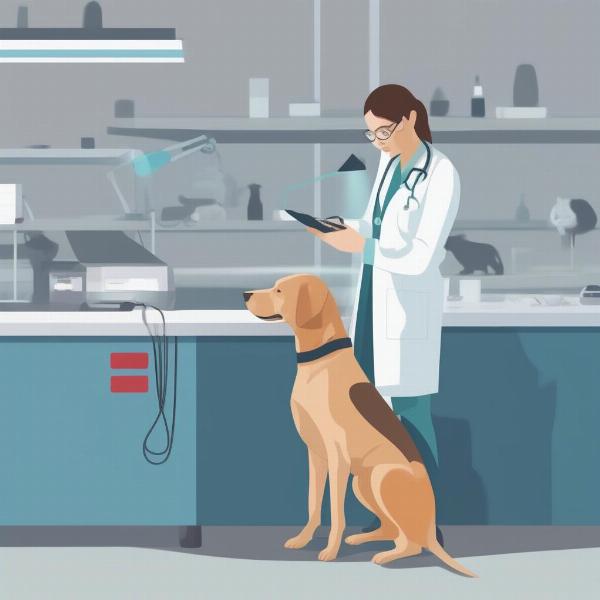Raw dog food diets are gaining popularity among dog owners seeking a more natural approach to their pet’s nutrition. While a well-planned raw diet can offer numerous benefits, it’s essential to ensure it provides all the necessary nutrients. This is where raw dog food supplements play a crucial role. Supplementing a raw diet can help address potential nutritional deficiencies and support your dog’s overall health and well-being. Choosing the right supplements requires careful consideration of your dog’s individual needs, age, breed, and activity level.
Understanding the Need for Raw Dog Food Supplements
While the concept of feeding dogs a raw diet mimics their ancestral eating habits, today’s commercially produced meat sources may lack certain essential vitamins and minerals found in whole prey. A balanced raw diet should include muscle meat, organ meat, and bone, but even with careful planning, imbalances can occur. Raw dog food supplements bridge these nutritional gaps, ensuring your dog receives everything they need to thrive. For instance, growing puppies and senior dogs often have different nutritional requirements than adult dogs. Similarly, highly active dogs may need additional supplements to support their increased energy expenditure.
Key Nutrients to Consider
Several key nutrients are often supplemented in raw dog food diets:
- Calcium and Phosphorus: Crucial for bone health, especially in growing puppies.
- Vitamins A, D, E, and K: Essential fat-soluble vitamins supporting various bodily functions.
- B Vitamins: Important for energy production, nerve function, and red blood cell formation.
- Omega-3 Fatty Acids: Provide anti-inflammatory benefits and support healthy skin and coat. salmon skin for dogs
- Trace Minerals: Minerals like zinc, copper, and iodine are vital for enzyme function and overall health.
Choosing the Right Raw Dog Food Supplements
Selecting the right supplements for your dog requires careful consideration. Always consult with your veterinarian before adding any supplements to your dog’s diet. They can help determine if supplements are necessary and recommend appropriate dosages.
Types of Supplements Available
Raw dog food supplements come in various forms, including powders, capsules, liquids, and chews. The best form depends on your dog’s preferences and the specific supplement. For example, liquid multivitamin for dogs can be easily mixed with food.
Quality and Sourcing
Opt for high-quality supplements from reputable brands. Look for products that are free from fillers, artificial colors, and flavors. Consider sourcing supplements made with natural ingredients and sustainable practices. You can research brands, read reviews, and consult with your vet for recommendations.
Potential Risks of Over-Supplementation
While supplements can be beneficial, over-supplementation can be harmful. Excessive intake of certain vitamins or minerals can lead to toxicity and health problems. Always follow the recommended dosage guidelines and consult with your veterinarian if you have any concerns.
Monitoring Your Dog’s Health
Regularly monitor your dog’s health for any signs of nutrient deficiencies or imbalances. Look for changes in appetite, energy levels, coat condition, and stool quality. Annual veterinary check-ups are essential for assessing your dog’s overall health and nutritional status.
 Veterinarian Examining a Dog
Veterinarian Examining a Dog
Conclusion
Raw dog food supplements can be a valuable addition to a raw diet, ensuring your canine companion receives all the essential nutrients for optimal health. Careful planning, consultation with your veterinarian, and regular monitoring are crucial for safely and effectively supplementing your dog’s raw food diet. Remember that a balanced and complete diet is the cornerstone of a healthy and happy dog. raw poultry for dogs
FAQ
- Do all dogs on a raw food diet need supplements? Not necessarily. A well-balanced raw diet can provide all the necessary nutrients. However, supplements can be beneficial in addressing potential deficiencies.
- What are the signs of a nutritional deficiency in dogs? Signs can include poor coat condition, lethargy, digestive issues, and weakened immune system.
- Can I give my dog human supplements? No, never give your dog human supplements without consulting your vet. Dosages and formulations are different for dogs and can be harmful.
- How do I choose a reputable supplement brand? Look for brands that prioritize quality ingredients, have transparent sourcing practices, and are recommended by veterinarians.
- What should I do if I suspect my dog has a nutritional imbalance? Consult your veterinarian immediately. They can perform tests to diagnose any deficiencies and recommend appropriate treatment.
- Are there any specific supplements for senior dogs on a raw food diet? Yes, supplements supporting joint health, cognitive function, and immune system are often beneficial for senior dogs. garlic tablets for dogs
- Can supplements be used with commercially available raw dog food? Yes, supplements can be used to enhance the nutritional profile of commercially available raw dog food, especially if it doesn’t contain a variety of ingredients. can dogs eat minnows
ILM Dog is a leading online resource dedicated to providing expert advice and valuable information on all aspects of dog care and wellbeing. From breed selection and nutrition to training and health, we offer comprehensive guides and resources to help you provide the best possible care for your canine companion. We cover topics like raw feeding, supplement choices, and breed-specific health concerns. For expert advice tailored to your dog’s needs, contact us via email at [email protected] or call us at +44 20-3965-8624. ILM Dog is here to support you every step of the way on your dog ownership journey.